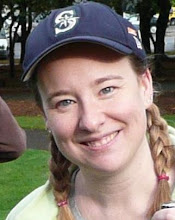In the meantime, I'll catch up on a new item I started: #7, read five biographies.
The first one I read was It Doesn't Take a Hero: The Autobiography of General H. Norman Schwarzkopf (Bantam, 2009). I was fascinated by the story of the man, of course, but I was equally pleased to find that the book filled many hazy gaps in my understanding of the conflicts in Vietnam and the Middle East. Schwarzkopf's grasp of (and clear communication of) the cultural differences between Eastern and Western culture was incredibly helpful in allowing the reader to understand subtleties of the conflicts that don't quite fit in the World Events section of the newspaper. His dry wit sparkled through in many places, and I realize that he is probably a very entertaining man to talk to in person. More than anything, I came away from the book with a renewed appreciation for what soldiers go through on a daily basis.
Today I finished the second on my list, Helen Keller: The Story of My Life (Penguin Books, 2002). Her autobiography begins with her earliest memories and concludes at the time of writing, her second year of college. Some of the stories of her early life were familiar from the Childcraft Encyclopedia set my parents had when I was a child, but I had not realized until reading the full autobiography that Keller was in fact an amazingly educated woman. She writes of "seeing" Shakespeare plays (by having an observer spell the dialogue into her hand) after having studied them herself, reading German philosophers in the original language, her travails with learning to speak French (by putting her hands on the lips and throat of her French teacher) - can you imagine? Speak French! A woman who has never heard the language spoken and has to learn each word, each phrase, each turn of syllable with her hands. I can't fathom the determination it must have required. And I had a bad enough time with geometry without having to use bent bits of wire to "draw" the problems and remember every label of the angles and lines in my head.
Her love of learning is evident in every line of the book, and it inspired me with the desire to read more, write more, and just pay more attention to life generally. My favorite quote is an eloquent expression of the exasperation all writers must feel at some time:
"It seems to me that the great difficulty of writing is to make the language of the educated mind express our confused ideas, half feelings, half thoughts, when we are little more than bundles of instinctive tendencies. Trying to write is very much like trying to put a Chinese puzzle together. We have a pattern in mind which we wish to work out in words; but the words will not fit the spaces, or, if they do, they will not match the design. But we keep on trying because we know that others have succeeded, and we are not willing to acknowledge defeat."
I am thoroughly looking forward to reading more of these - there is as much variety among autobiographies as there is among people, which is to say all the variety in the world.









YES!
ReplyDeleteI have patience, sometimes too much. And, no, it is not procrastination. ~
Daring!
ReplyDelete